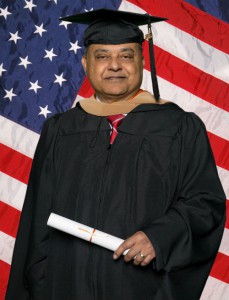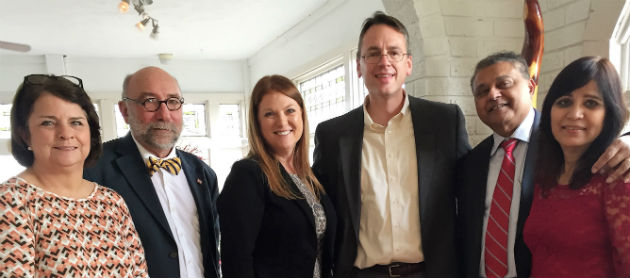 What do Harvard, Johns Hopkins, MIT, Stanford and the University of Texas at Tyler have in common?
What do Harvard, Johns Hopkins, MIT, Stanford and the University of Texas at Tyler have in common?
John Rathnam.
After Rathnam, 68, had a kidney transplant in 2013, he has been on a quest to become one of the most knowledgeable human beings on the planet about kidney transplants. In the last four years, he has earned 44 online medical, business and legal certificates from some of the most prestigious institutions in the world.
“They tell you if you’re going to see a doctor to make sure the doctor has spent 10,000 hours or has 10 years’ experience to ensure they have seen any problem somebody may have,” he said. “I’ve spent the 10,000 hours and done what I needed to do.”
Rathnam capped (and gowned) his quest when he graduated with an online Master of Business Administration with a Concentration in Healthcare Management from UT Tyler in 2016.
“My wife said, ‘You’re addicted to learning,’” he said. “I wanted to get the MBA, and several other schools accepted me, when I found out about UT Tyler. Their program was different from the others. For me, that was important.”
Rathnam gained all that knowledge so he could start a nonprofit organization to improve and increase the number of living donors. His nonprofit, Living Donor Outreach, opened in September 2015. Prior to that, Rathnam owned Vision Enterprises, an insurance and group travel company based in Riverside, California, for more than 22 years.
“My marketing was basically on LinkedIn,” he said. “In the last two-and-a-half years, I’ve made over 7,600 connections. These are mainly in the transplantation field — transplant surgeons, heads of hospitals and transplant professionals — and about 1,000 people in the media — TV anchors, heads of media organizations and journalists.
“I help patients around the country. If they’re facing stumbling blocks or problems, all I need to do is write one sentence to my connections at their institution and their lives change for the better. That makes me feel good.”
From the Heart
Rathnam, who was born in India, never had any issues with his kidneys until he underwent quintuple bypass heart surgery. The dye from the angiogram ravaged his kidneys.
“I was kind of surprised I wasn’t getting better [after heart surgery],” he said. “The doctors said, ‘Oh, you need to see a nephrologist.’ I said, ‘Why? There’s nothing wrong with my kidneys.’ A few months later, I was on dialysis. I spent four years on dialysis.”
Rathnam was assigned to a hospital where he was tested for three-and-a-half years and never provided with a transplant even though he had several donors willing to donate. Frustrated, he went to another hospital and received a kidney transplant less than a year later.
“I made friends with the surgeon and tried to understand why I had to go through this long journey,” Rathnam said. “He tried to help me out and said, ‘I want you to be on the UNOS [United Network for Organ Sharing] board. I said, ‘No, I’m just a little guy — nobody is going to listen to me.’”
Then, Rathnam became motivated to make a difference.
“Six months after my surgery, I started really investigating, researching and studying this problem,” he said. “That was why I completed 65 courses in the last three-and-a-half years and 44 certifications from the top schools in the country and overseas.
“Part of that, including the MBA in Healthcare Management, was to get the credibility I need as I deal with medical professionals and transplantation professionals. During this time, I developed a program to help patients, donors and transplantation professionals improve the process and increase the number of living donors.”
Long, Winding Road
Rathnam left India when he was 21. He was studying engineering and sciences when he took a mission trip to Sierra Leone, West Africa.
“I taught 200 high school students science in the bush for about a year with no running water and no electricity,” he said. “I worked 16 hours a day.”
Rathnam eventually moved to the United States in 1971 to study food science and technology because his father was introducing soy milk production in India. When that venture fell through, Rathnam worked for a credit bureau and then a church. That led him to earn a bachelor’s degree in theology from Southern Adventist University in Tennessee.
“After high school, I had a full scholarship to medical school,” he said. “I didn’t want to get into medicine for two reasons: one, I didn’t want to deal with blood; two, when I hear symptoms, I feel them. I didn’t want to live my life that way. After I quit working for large corporations in 1994, I decided to open a residential care facility for the elderly that I ran for five years. It was a 24-hour care facility. That was my first foray into healthcare.”
Once he decided to get back into healthcare, Rathnam started racking up multiple online certifications.
“I picked and chose the ones that would give me a better understanding of working in healthcare and business in an organization,” he said. “The main schools I used were Stanford, Harvard, Johns Hopkins, Michigan, Duke, Rice — the top medical schools. I even took some courses from European universities, which were a lot more difficult.”
The most surprising thing to Rathnam was how few people take advantage of online certificate programs.
“It is so low I couldn’t believe it,” he said. “Around two-and-a-half to three percent receive certificates. I’m thinking, ‘What’s wrong? I think I have a problem.’”

East Texas Hospitality
It didn’t take Rathnam long to discover that there was something special about UT Tyler.
“The people at UT Tyler I spoke with in recruiting … I have never met anybody like them,” he said. “They did all of my paperwork in five days. I’ve dealt with other schools and it sometimes takes months.
“When I asked [collections officer] Kayla Christiansen, ‘Where do you want me to send the documents?’ She said, ‘You send it to me and I’ll walk it over.’ You don’t hear that today. I thought, ‘Wow, that’s interesting.’ I was very impressed.”
Rathnam, who is also a motivational speaker, said his three favorite courses in the online MBA program were Health Care Marketing, taught by Dr. Kerri Camp; Leading and Managing People taught by Dr. Stephen Bushardt, and Formulating and Implementing Strategy, taught by Dr. Brent Beal.
“Dr. Beal encouraged me to write about my experiences and inspired me to write a book about my journey to transplantation,” he said. “With his guidance I have started on my book.”
When Rathnam, who lives in California, made his first trip to Tyler, Texas, he said he invited his professors to lunch so he could meet them and share his journey.
“When I visited Tyler for my graduation, I invited all of my professors to lunch and met them,” Rathnam said. “Some of the professors have become friends for life.”
Smart Move
Rathnam is happy he did the research and discovered the MBA in Healthcare Management online program at UT Tyler. Even as an online graduate, he is one proud Patriot.
“If they had a Ph.D. program that was open and could be worked around what I’m trying to do, I would enroll in the program,” he said. “Some of the research I have done is unique. Nobody else has done that kind of research.”
Rathnam said he has recommended both the business and nursing programs at UT Tyler to several people after his positive experience.
And what about another certification?
“I’ve taken most of the certificates off my wall because there’s no more room,” he said. “Every time I finish a course from a different school, I get a cap. I had them displayed, but guess what? I had to put them away, too.”
All the more room for his MBA.
Learn more about the UT Tyler online Master of Business Administration with a Concentration in Healthcare Management.